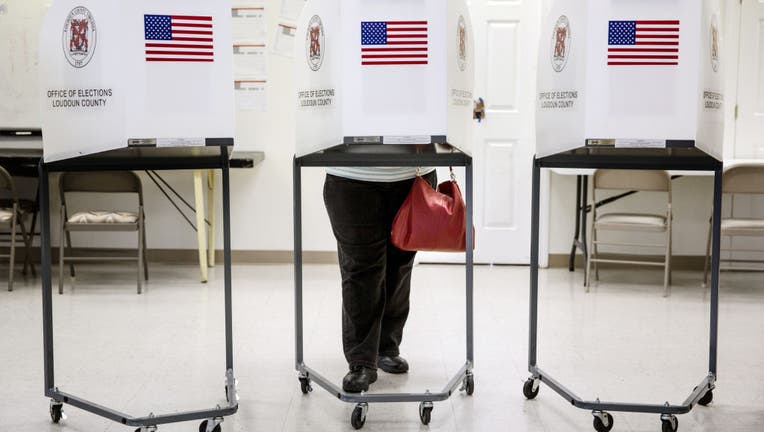Which states vote on Super Tuesday?

FILE - A voter casts her ballot during Virginia's primary election, March 1, 2016, at the Holy Trinity Lutheran Church in Leesburg, Virginia. (Photo by Evelyn Hockstein/For The Washington Post via Getty Images)
With no Democratic presidential primary candidate mounting an overwhelming lead in the delegate race in the nation’s first primary battles, Super Tuesday is poised to play an even bigger role in the 2020 presidential elections than it has in years past.
And with both California and Texas – the nation’s two most populous states – holding primaries on March 3, around 40 percent on Americans will be voting on Super Tuesday.
Super Tuesday an ‘important thermometer’ of voter support for candidates looking to clinch nomination
While Iowa and New Hampshire get much of the hype during primary season, equally important if not more is Super Tuesday — a day early on in an election year when voters in roughly a dozen states go to the polls.
Given the importance of the Super Tuesday primaries and the role these races will play in deciding who goes up against President Trump in November’s general election, Fox News has compiled a list of the states holding a vote on March 3 and how many delegates are up for grabs in each.
Alabama: The state holds an open primary, with the 61 delegates being awarded on a proportional basis.
American Samoa: The territory holds an open caucus, with the territory awarding 11 delegates, of which 6 are pledged delegates allocated on the basis of the results of the caucuses.
Arkansas: The state holds an open primary, with the 36 delegates being awarded on a proportional basis.
California: The state holds a semi-closed primary – meaning only Democrats and unaffiliated voters can cast a ballot, with the 494 delegates being awarded on a proportional basis.
Colorado: The state holds a semi-closed primary – meaning only Democrats and unaffiliated voters can cast a ballot, with the 80 delegates being awarded on a proportional basis.
Democrats Abroad: This is an open primary in which any U.S. citizen living abroad who is a member of Democrats Abroad can participate, with the 17 delegates being awarded on a proportional basis.
Maine: The state holds a closed primary – meaning only Democrats can cast a ballot, with the 32 delegates being awarded on a proportional basis.
Massachusetts: The state holds a semi-closed primary – meaning only Democrats and unaffiliated voters can cast a ballot, with the 114 delegates being awarded on a proportional basis.
Minnesota: The state holds an open primary, with the 91 delegates being awarded on a proportional basis.
North Carolina: The state holds a semi-closed primary – meaning only Democrats and unaffiliated voters can cast a ballot, with the 122 delegates being awarded on a proportional basis.
Oklahoma: The state holds a semi-closed primary – meaning only Democrats and unaffiliated voters can cast a ballot, with the 42 delegates being awarded on a proportional basis.
Tennessee: The state holds an open primary, with the 73 delegates being awarded on a proportional basis.
Texas: The state holds an open primary, with the 261 delegates being awarded on a proportional basis.
Utah: The state holds an open primary, with the 35 delegates being awarded on a proportional basis.
Vermont: The state holds an open primary, with the 24 delegates being awarded on a proportional basis.
Virginia: The state holds an open primary, with the 124 delegates being awarded on a proportional basis.

